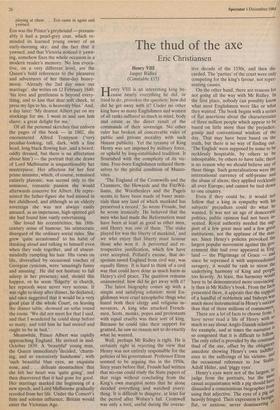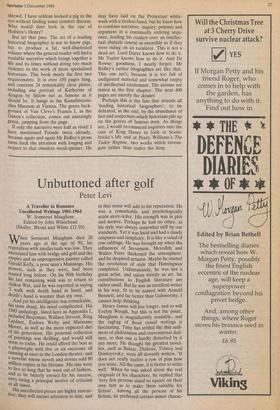The thud of the axe
Eric Christiansen
Henry VIII Jasper Ridley (Constable £15) Henry VIII is an interesting king be- cause nearly everything he did, or tried to do, provokes the question: how did did he get away with it? Under no other king have so many Englishmen and women of all ranks suffered so much in mind, body and estate as the direct result of the commands .of their sovereign. No other ruler has broken all conceivable rules of public and private morality with such blatant publicity. Yet the tyranny of King Henry was not imposed by military force, or upheld by long-established tradition. It flourished with the complicity of its vic- tims. Free-born Englishmen reduced them- selves to the pitiful condition of Musco- vites.
`The England of the Cromwells and the Cranmers, the Howards and the FitzWil- Hams, the Wriothesleys and the Pagets seems to have been made of baser mate- rials than any land of which mankind has preserved a record.' So wrote Froude, but he wrote ironically. He believed that the men who had made the Reformation must have been at least as good as other men, and Henry was one of them. 'The stake played for was the liberty of mankind,' and we who enjoy that liberty must honour those who won it. A perverted and re- trospective justification, which few have ever accepted. Pollard's excuse, that de- spotism saved England from civil war, was equally flimsy. It is hard to think of a civil war that could have done as much harm as Henry's civil peace. The question remains unanswered: how did he get away with it? The latest biography comes up with a simple and satisfying solution: most En- glishmen were cruel xenophobic thugs who hated both their clergy and religious in- novators. A king who attacked French- men, Scots, monks, popes and protestants with equal cruelty was their sort of king. Because he could take their support for granted, he saw no reason not to do exactly what he wanted.
Well, perhaps Mr Ridley is right. He is certainly right in rejecting the view that Henry was not entirely responsible for the policies of his government. Professor Elton seemed to be arguing this in the 1950s. Sixty years before that, Froude had written that no-one could study the State papers of that reign without concluding from the King's own marginal notes that he alone decided everything and watched every- thing. It is difficult to disagree, at least for the period after Wolsey's fall. Cromwell was only a tool, useful during the overac- tive decade of the 1530s, and then dis- carded. The 'parties' of the court were only competing for the king's favour, not repre- senting causes. On the other hand, there are reasons for not going all the way with Mr Ridley. In the first place, nobody can possibly know what most Englishmen were like or what they wanted. The book begins with a series of flat assertions about the characteristics of three million people which appear to be based on little more than the prejudice, gossip and conventional wisdom of the day. That may have been based on the truth, but there is no way of finding out. `The English' were supposed by some to be recklessly hospitable, by others to be inhospitable, by others to have tails; there is no reason why we should believe any of these things. Such generalisations were the international currency of self-praise and the abuse of aliens; they applied recklessly all over Europe, and cannot be tied down to one country. Even if they could be, it would not follow that a king in sympathy with his subjects' prejudices could do what he wanted. It was not an age of democratic politics; public opinion had not been in- vented. Royal authority needed the sup' port of a few great men and a few great institutions, not the applause of the mos' ses. Since Henry's policies provoked the largest popular movement against the goy" ernment that had ever appeared in Eng; land — the Pilgrimage of Grace — and since he repressed it with unprecedented savagery, it would be rash to stress the
underlying harmony of King and people
too heavily. At least, this harmony would have to be demonstrated more convincing' ly than in Mr Ridley's book. From the facts presented there, it appears that the support of a handful of noblemen and bishops Was much more instrumental in Henry's success than that of three millions of commoners' There are a lot of facts to choose from., have never read a life of Henry with s° much to say about Anglo-Danish relations: for example, and at times the narrative is so congested that it is difficult to follow'' The only relief is provided by the continua' thud of the axe, offset by the obligatory anecdote showing Henry's own indiffer," ence to the sufferings of his victims, an' the occasional reference to Joe Stalin' Adolf Hitler, and 'piggy eyes'. Henry's eyes were not of the largest, to judge from the portraits, but the in % casual acquaintance with a pig should hay. dissuaded a conscientious biographer fr°' using that adjective. The eyes of a pig. are„, heavily fringed. Their expression is berlg flat, or anxious; never domineering o"r
shrewd. I have seldom looked a pig in the eye without finding some comfort therein. Who would dare look in the eye of Holbein's Henry?
But let that pass. The art of a leading historical biographer is not to know pigs, but to produce a fat, well-illustrated volume where the general reader will find a readable narrative which brings together a life and its times without doing too much violence to the work of more specialised historians. This book meets the first two requirements. It is over 450 pages long, and contains 24 remarkably clear plates, including one portrait of Katherine of Aragon by Sittow not as famous as it should be. It hangs in the Kunsthistoris- ches Museum at Vienna. The green back- ground of Van Cleve's Francis I, in the Queen's collection, comes out amazingly green, jumping from the page.
If only the narrative were half as vivid! I have mentioned Froude twice already, because again and again Mr Ridley's prose turns back the attention with longing and respect to that obsolete word-spinner. He may have laid on the Protestant white- wash with a tireless hand, but he knew how to combine narrative, inquiry, polemic and argument in a continually enticing sequ- ence, leading his readers over an intellec- tual obstacle course as smoothly as if they were riding on an escalator. This is not a dead art. Lord Dacre knows how to do it. Mr Taylor knows how to do it. And Dr Rowse: goodness, I nearly forgot. Mr Ridley's earlier biographies are like that. This one isn't, because it is too full of undigested material and somewhat empty of intellectual excitement. The axioms are stated in the first chapter. The next 400 pages are merely the dossier.
Perhaps this is the fate that attends all `leading historical biographers': to be defeated, in the end, by the abundance of fact and conjecture which historians pile up on the graves of famous men. As things are, I would recommend inquirers into the case of King Henry to look at Scaris- bricke's life and at Penry Williams's The Tudor Regime, two works which investi- gate rather than indict the king.























































 Previous page
Previous page